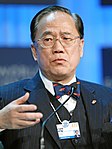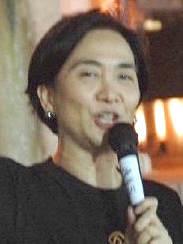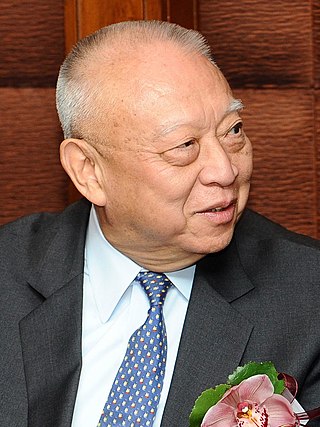
Tung Chee-hwa is a Hong Kong businessman and politician who served as the first Chief Executive of Hong Kong between 1997 and 2005, upon the transfer of sovereignty on 1 July. He served as a vice chairman of the Chinese People's Political Consultative Conference (CPPCC) between 2005 and 2023.

The Liberal Party (LP) is a pro-Beijing, pro-business, and conservative political party in Hong Kong. Led by Tommy Cheung and chaired by Peter Shiu, it holds four seats in the Legislative Council, and holds five seats in the District Councils.

The Chief Executive of the Hong Kong Special Administrative Region is the representative of the Hong Kong Special Administrative Region and head of the Government of Hong Kong. The position was created to replace the office of governor of Hong Kong, the representative of the monarch of the United Kingdom during British rule. The office, stipulated by the Hong Kong Basic Law, formally came into being on 1 July 1997 with the handover of Hong Kong from the United Kingdom to the People's Republic of China.

Sir Donald Tsang Yam-kuen is a former Hong Kong civil servant who served as the second Chief Executive of Hong Kong from 2005 to 2012.

The Executive Council of Hong Kong (ExCo) is the cabinet of the Government of Hong Kong, acting as a formal body of advisers to the Chief Executive of Hong Kong that serves as a core policy-making organ assisting the Chief Executive. It is analogous to other Executive Councils in the Commonwealth such as the Federal Executive Council of Australia, the Executive Council of New Zealand, and the Privy Council of the United Kingdom.

James Tien Pei-chun, GBS, OBE, JP is the former chairman and Leader of the Liberal Party (LP) and former member of the Legislative Council of Hong Kong (Legco). Coming from the background of an entrepreneur, he was also a non-official member of the Executive Council of Hong Kong (Exco), member of Central and Western and Kwai Tsing District Council and Hong Kong member to the Chinese People's Political Consultative Conference (CPPCC).

Elections in Hong Kong take place when certain political offices in the government need to be filled. Hong Kong has a multi-party system, with numerous parties in the Legislative Council. The Chief Executive of Hong Kong is nonpartisan but has to work with several parties to form a coalition government.
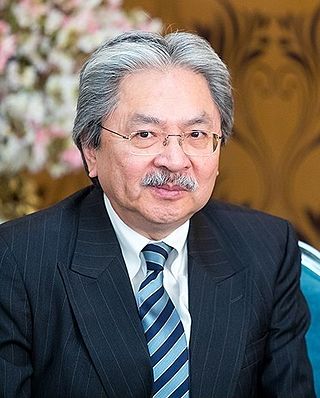
John Tsang Chun-wah, GBM, JP is a Hong Kong former senior civil servant and government official who was the longest-serving Financial Secretary in the Special Administrative Region period to date.

The 2007 Hong Kong Chief Executive election was held on 25 March 2007 to select the Chief Executive of Hong Kong. Incumbent Chief Executive Donald Tsang was re-elected, defeating the pro-democracy challenger, legislator Alan Leong of the Civic Party by 649 to 123 votes in the 796-member Election Committee dominated by the pro-Beijing electors.

The 2002 Hong Kong Chief Executive election was to select the second term of the Chief Executive (CE) of the Hong Kong Special Administrative Region (HKSAR). Incumbent Tung Chee-hwa was nominated by the 800-member Election Committee (EC) without competition.

Democratic development in Hong Kong has been a major issue since its transfer of sovereignty to the People's Republic of China in 1997. The one country, two systems principle allows Hong Kong to enjoy high autonomy in all areas besides foreign relations and defence, which are responsibilities of the central government. Hong Kong's Basic Law, also adopted after the 1997 handover, allowed residents to vote for local district councillors and directly elect about half of the region's legislators at the time. Many Hongkongers became concerned, however, after the first Chief Executive, Tung Chee-hwa, appeared to have mishandled this issue, while human rights and universal suffrage have also become focal points for the pro-democracy camp.
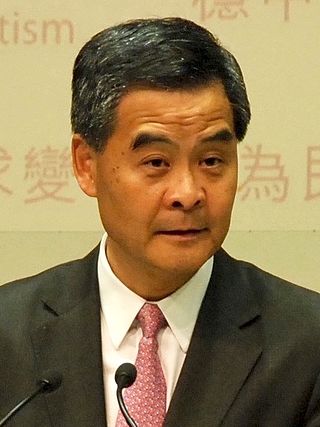
The 2012 Hong Kong Chief Executive election was held on 25 March 2012 to select the Chief Executive of Hong Kong (CE), the highest office in the Hong Kong Special Administrative Region (HKSAR), by a 1,193-member Election Committee (EC) to replace the incumbent Chief Executive. Won by the former non-official convener of the Executive Council of Hong Kong Leung Chun-ying, the election was the most competitive as it was the first election with more than one pro-Beijing candidate since 1996 election.

The first term of Donald Tsang as chief executive of Hong Kong, officially considered part of "The 2nd term Chief Executive of Hong Kong", relates to the period of governance of Hong Kong since the transfer of sovereignty of Hong Kong, between 25 June 2005 and 30 June 2007. Former civil-servant Donald Tsang was elected on 25 June 2005 to fill the position vacated by the resignation of his predecessor, Tung Chee Hwa.
The 2010 Hong Kong electoral reform was the series of events began in 2009 and finalised in 2010 under the Consultation Document on the Methods for Selecting the Chief Executive and for Forming the Legislative Council in 2012, a document published on 18 November 2009 by the Government of Hong Kong to broaden the scope of political participation and increase the democratic elements in the 2012 elections in line with the Hong Kong Basic Law.

The 2017 Hong Kong Chief Executive election was held on 26 March 2017 for the 5th term of the Chief Executive of Hong Kong (CE), the highest office of the Hong Kong Special Administrative Region (HKSAR). Former Chief Secretary for Administration Carrie Lam beat former Financial Secretary John Tsang and retired judge Woo Kwok-hing, receiving 777 votes from the 1,194-member Election Committee.

The Second term of Tung Chee-hwa as Chief Executive of Hong Kong, or Tung administration, officially considered part of "The 2nd term Chief Executive of Hong Kong", relates to the period of governance of Hong Kong since the transfer of sovereignty of Hong Kong, between 1 July 2002 and 12 March 2005 until Tung Chee-hwa resigned from the office and the rest of the term was taken up by former Chief Secretary for Administration Donald Tsang.
The 2005 Election Committee subsector by-elections were held on 1 May 2005 to fill the 33 vacancies in 17 subsectors of the Election Committee for electing the Hong Kong Chief Executive in the Chief Executive election in following March.
The 2005 Hong Kong electoral reform was carried out in late 2005 for the selection of the Chief Executive of Hong Kong (CE) in 2007 and Legislative Council of Hong Kong (LegCo) in 2008. The reform proposals were ultimately voted down by the pro-democracy camp.

The 2022 Hong Kong Chief Executive election was held on 8 May 2022 for the 6th term of the Chief Executive (CE), the highest office of the Hong Kong Special Administrative Region (HKSAR). Incumbent Carrie Lam, who was elected in 2017, declined to seek a second term for family reasons and finished her term on 30 June 2022. Former Chief Secretary John Lee was the sole candidate approved by the central government of China in the election and the only candidate to be nominated. He received 1,416 electoral votes (99.44%) and assumed office on 1 July 2022.

The Seventh Legislative Council of Hong Kong is the current meeting of the legislative branch of the Hong Kong Special Administrative Region Government. It is scheduled to meet in the Legislative Council Complex, from 1 January 2022 to 31 December 2025, overlapping the six months of Carrie Lam as the fifth term of the Chief Executive and the sixth term of Chief Executive. The membership of the Legislative Council will be determined in the December 2021 election.


